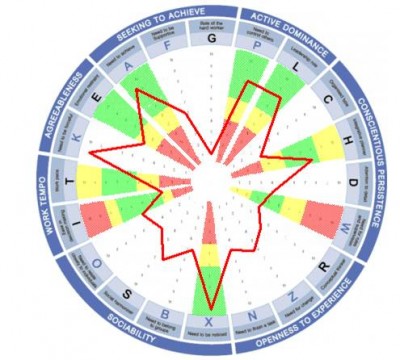Psychometrics In Use - Recruitment and Selection

Supporting the Process
It is important to note that psychometric assessments are designed to support decision making processes rather than have an “end all and be all” approach. When conducting a recruitment and selection process, the decision maker should also consider the applicant’s work history, academic achievements, interview performance and referee report evidence. Psychometric results provide an additional layer of evidence to help inform decisions.
Read on to learn about the different personality assessments and ability assessments we use to support recruitment and selection processes.
Personality Assessments for Recruitment and Selection
Not all personality assessments have been designed with recruitment and selection in mind and some tools do not go into sufficient depth to provide a comprehensive analysis for recruitment and selection purposes.
Merit Solutions Psychometric Services use two different personality assessment tools, both used extensively for recruitment and selection. Both tools are also highly respected, well recognised and used globally. Both meet the reliability and validity scales you should expect from your assessment tool.
Before results are shared, a Merit Solutions Psychometric Consultant will arrange a feed-back discussion with the applicant to openly talk about the findings and validate further where necessary. As there is no one test on the market that has 100% validity, it is important to have this feedback session with the applicant to gather further information and to clarify/investigate why they may have responded in a particular way. We also believe it is Best Practice that the respondent is provided with their own copy of the results in addition to the client/decision maker.
Click on the tabs below to find out more about the different assessments we can administer for you
PAPI 3 (Personality and Preference Inventory)
PAPI is an internationally recognised profiling tool used extensively around the world. Many know this assessment as “the wheel”. PAPI 3 can be completed online. It provides valuable insights into an applicant’s preferences and behaviours at work and how they may fit into a role, team or organisation as a whole. PAPI can be used for a number of purposes in addition to recruitment and selection and is available in a number of languages, is culturally sensitive and was first designed by Professor Max Kostick at the Boston State College in the 1960’s.
PAPI 3 focuses on an individual’s preferences on a sten scale of 0 – 10 regarding their:
Impact and Drive – including Need to Achieve, Need to Influence and Need to Lead.
Organisation & Structure – including Need to Finish a Task, Need for Rules and Guidelines, Attention to Detail, Plan and Need to be Organised.
Ideas and Change – including Need for change and Conceptual thinker
Interaction – including Need to Relate Closely to Individuals, Social Harmoniser, Need to Belong to Groups.
Work Momentum – including Need to be Direct, Work Tempo and Ease in Decision Making.
Composure – including Emotional Restraint, Optimism, Core composure.

15FQ+ (The Fifteen Factor Questionnaire Plus)
An internationally recognised assessment of personality and individual differences. The 15FQ+ is based on one of the most researched and respected models of personality, identifying behaviour preferences across Cattell’s 16 personality constructs (Cattell, 1946) and the Big Five personality Traits (McCrae and Costa, 1987). This tool provides an insight into how people typically think, feel and interact. The 15FQ+ also considers if these traits that could be productive or counter-productive within an organisation. This assessment can also be completed online, is available in multiple languages and is culturally sensitive.
The Big Five Profile uses a sten scale of 1 – 10 focussing on:
- Introversion vs Extraversion
- Low Anxiety vs High Anxiety
- Pragmatism vs Openness
- Independence vs Agreeableness
- Low Self-Control vs High Self-Control
The 15FQ+ draws on 15 of Cattell’s 16 personality factors and groups them together to reveal:
- Interpersonal Styles Profile
- Thinking Style Profile
- Coping Style Profile
This assessment tool has been validated by using a large global norm group consisting of people from various occupations. Results can be benchmarked against general population groups or specific occupational groups. Although this assessment tool is mostly used for recruitment and selection purposes, its comprehensive results and findings also lends well to support leadership development, team development and career development training programs.
The Values and Motives Inventory
This assessment profiles the motivational forces that are expected to drive people in particular activities. Focussing on three main areas, this tool assesses:
- Interpersonal values – that influence an individual’s approach to their relationships with others.
- Intrinsic values – personal beliefs and attitudes that guides an individual’s approach to tackle everyday problems, and
- Extrinsic values – those that influence individual behaviour in the workplace.
Due to the nature of this assessment, it can also be used for employee development, team building, career development and outplacement.
Ability Assessments for Recruitment and Selection
Ability Assessments can be used to a measure a variety of mental ability skills including verbal, numeric and abstract reasoning, logical thinking, problem solving, job specific skills and even emotional intelligence.
The following ability assessments are accessed online (or at an extra cost can be supervised and administered by our office). Unlike personality assessments, most ability tests are timed.
Click on the tabs below to find out more about the different assessments we can administer for you
MSCEIT (Emotional Intelligence Ability Test)
The Mayer-Salovey-Caruso Emotional Intelligence Test is an ability-based assessment that measures emotional intelligence. The test was developed by John D. Mayer, Peter Salovey, and David R. Caruso in the USA in cooperation with Multi-Health Systems Inc. The MSCEIT features the Four-Branch model of emotional intelligence, each with associated scales, so each can be scored and analysed. The four models being:
- Perceiving Emotions
- Facilitating Thought
- Understanding Emotions
- Managing Emotions.
This tool measures how well people respond to social tasks, read facial expressions, and solve emotional problems. This assessment can be taken online, and unlike many other ability tests this assessment tool is untimed but takes, on average, 40 minutes to complete.
Emotify (Emotional Intelligence Ability Test)
A game-based on-line assessment that assesses an individual’s ability to accurately perceive emotions, understand the connections between emotions, and situations that lead to specific emotional reactions. This assessment comprises of three mini-online games and takes approximately 20 minutes to complete.
Cognify (Cognitive Ability Test)
This assessment tool focusses on an individual’s verbal, numerical and abstract reasoning skills in addition to their problem-solving capabilities. Results of this test are a good indicator of how applicants will learn, adapt and perform on a job. This assessment comprises of six mini-online games and takes approximately 30 minutes to complete.
CRTBi (Critical Reasoning Test Battery internet)
Critical reasoning assessments are most relevant to management level roles as they focus on business related problems and situations, compared to the more traditional cognitive reasoning tests.
The Verbal Critical Reasoning component of this assessment measures the ability to understand and draw logical conclusions and indicators from complex reporting.
The Numerical Critical Reasoning component of this assessment measures the ability to critically evaluate a wide range of numerical data for roles that require a strong understanding of financial, numerical and statistical information. This assessment battery takes approximately 50 minutes completion time.
Health & Safety Indicator Battery
For roles that require strict adherence to and understanding of Health and Safety rules and regulations, this series of tests will provide a strong indicator of ability and motivation to abide by Health & Safety protocol. This test battery comprises; a Health & Safety personality assessment and ability tests that assess: Following Instructions, Checking and understanding Symbolic meanings. Assessments can be undertaken online and take approximately 40 minutes (for all assessments).
Contact us to discuss your needs
(07) 3220 1166
